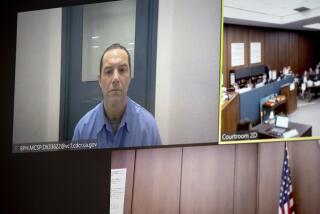For Pratt Legal Wheels Grind Slowly
- Share via
For more than half his life, Elmer “Geronimo” Pratt’s lawyers fought for the day when the former Black Panther Party leader’s 1972 murder conviction would be overturned.
That day came last Thursday, when Santa Ana Superior Court Judge Everett W. Dickey ruled that prosecutors had suppressed key evidence that might have led jurors to acquit Pratt.
Dickey ordered Pratt, 49, released from Mule Creek State Prison in Northern California and placed in the custody of the Los Angeles County sheriff. The Sheriff’s Department would transport Pratt to Superior Court for a hearing that could potentially free him whenever Supervising Criminal Courts Judge John H. Reid scheduled it.
Sounds straightforward enough.
Not exactly. The system works with with far less urgency. On Monday, Pratt was still in his prison cell and no hearing had been scheduled.
As Johnnie L. Cochran Jr., one of Pratt’s attorneys, put it early Monday, Pratt was caught in “bureaucratic hell.”
“I can’t get the Sheriff’s Department to go get the man,” Cochran said Monday. “They say they don’t have [Dickey’s] order. You would think after 25 years, somebody would . . . the sheriff himself should go get him.”
By the end of the day Monday, what looked like a procedural nightmare facing Pratt began to sort itself out. But for several days, the bureaucracy was frozen, apparently uncertain of the next step to take to implement a judge’s order to release a man from prison.
Four days after Dickey ordered Pratt released:
* Mule Creek prison officials said they were still waiting to hear from the Los Angeles County Sheriff’s Department to arrange transportation.
* Judge Reid, whom Dickey initially saw as being responsible for scheduling the next hearing in Pratt’s bid to be released, said through a spokeswoman he had no responsibility to initiate anything. (The State Judicial Council assigned Pratt’s case to Orange County last year after the entire Los Angeles County bench was disqualified.)
* Pratt’s hefty case file sat in Orange County. Dickey’s staff expected a courier from Los Angeles to pick it up, but no one called to arrange that.
Cochran was apoplectic.
“Pratt is still sitting in Mule Creek, his file is still in Orange County and we don’t have a judge,” Cochran said, adding that Reid would not even speak to one of Pratt’s attorneys, who wanted to discuss a bail hearing last Friday.
Pratt wants an early hearing because that promises to be the moment when the district attorney’s office announces whether it will retry him in the 1968 Santa Monica murder of teacher Caroline Olsen and the critical wounding her husband, drop the case and free him or appeal Dickey’s ruling.
Monday began with Pratt’s lawyers shaking their heads over the morass they had encountered.
San Francisco attorney Juliana Drous, who wrote Pratt’s petition seeking to have his conviction overturned, was outraged that Pratt was still sitting in prison.
“We were celebrating with champagne in the office on Thursday after Judge Dickey ruled,” she said, “and Geronimo had to go back to his cell. I felt awful about that.”
She speculated that circumstances leading to the reversal of his conviction were so unusual that all of the officials involved were confused about what they should do.
At Mule Creek State Prison spokesman Lt. Alen Koznek said prison officials did not receive a fax of Dickey’s decision until Monday afternoon.
“We will wait now for the Los Angeles County sheriff’s transportation unit to contact us,” he said, adding that the law allows officials time to implement a judge’s order. “We are waiting for information.”
Pratt’s lawyers finally made a dent Monday afternoon.
While Mule Creek officials were waiting to hear from the Sheriff’s Department, San Francisco attorney Stuart Hanlon was faxing a letter to the California Chief Justice Ronald M. George, who heads the Judicial Council.
Hanlon asked that jurisdiction over the case remain with Dickey, and that further proceedings be heard in Orange County.
George, however, was hearing an oral argument in Southern California, and a spokeswoman for the Judicial Council initially felt that Hanlon’s request would not be heard for a few more days.
A few hours later, however, George signed an order reappointing Dickey to Pratt’s case from June 2 to July 31 “and until completion and disposition of all causes and matters heard pursuant to this assignment.”
The anger in the Pratt camp began to subside.
“All of us are really glad we are back in Orange County,” said Hanlon, who first volunteered to help Pratt with his appeals nearly 24 years ago and has remained with the case since.
Los Angeles County Dist. Atty. Gil Garcetti has 60 days from last Friday to decide whether to appeal Dickey’s ruling, retry Pratt or drop the case. Legal observers feel Garcetti must appeal, if only to appease hawks in his own office who fervently believe that Panthers in general and Pratt specifically were criminal conspirators bent on waging war on police during the turbulent late 1960s.
However, Pratt would be eligible for bail if Garcetti filed an appeal.
Hanlon and Cochran plan to visit Pratt at Mule Creek today, and Hanlon expects that Dickey will schedule a hearing later this week.
More to Read
Sign up for Essential California
The most important California stories and recommendations in your inbox every morning.
You may occasionally receive promotional content from the Los Angeles Times.









